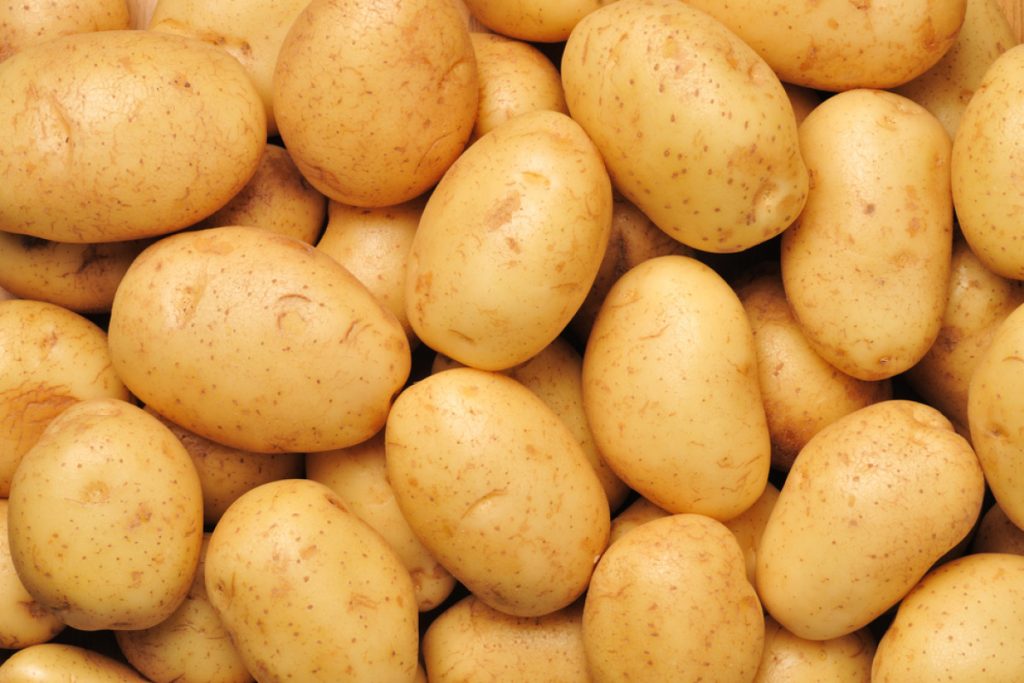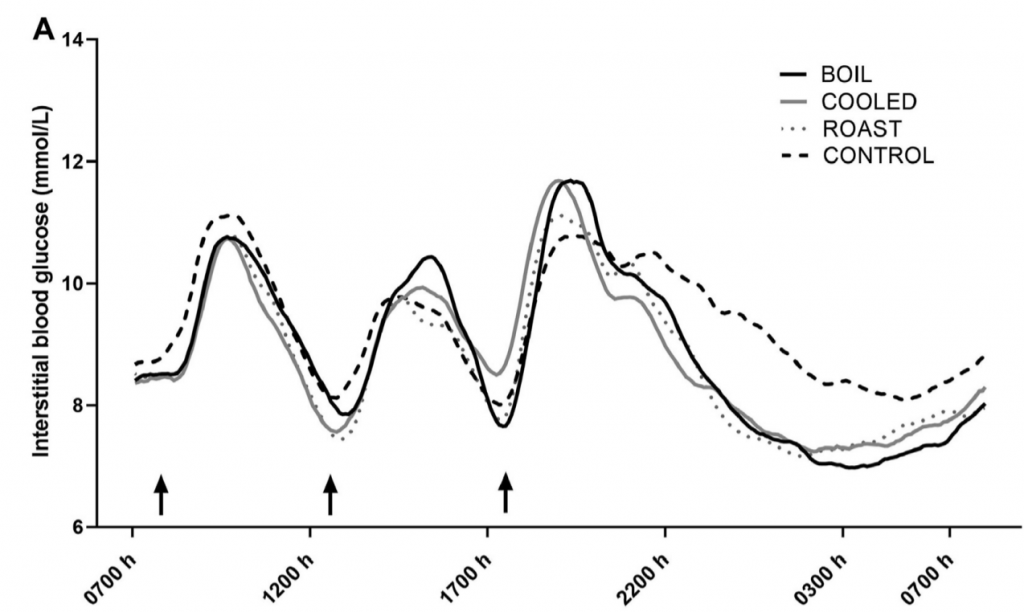Below is one of my favorite quotes.
“There is very little science … in nutritional science”
Of course there is valid science within the realm of ‘nutritional science’, but there is also a lot of ‘junk’, and I think you will agree the recent potato study is a prime example.
I contend that nutritional science is too often nothing more than marketing or sales propaganda. Typically it’s Big Food, Big Pharma or Medical Industry who ‘buy’ science to promote their food, drug or service.

The topic of this post is a study purported to show that potatoes are ok for type 2 diabetics. As you will see, this study is a perfect example of why I say, “there is very little real science in nutritional science” AND that too often nutritional science REALLY is nothing more than marketing propaganda for those that fund the ‘science’.
Preliminary Information
Here is the title to an article written about the study, “People with type 2 diabetes need not avoid eating potatoes based on glycemic index“.
I have done a lot of personal experimentation over the 10+ years I’ve had diabetes (and this blog). Many of my experiments have involved high carb foods including potatoes and rice. (Links at the end of the post)
I don’t need a ‘study’ to tell me if potatoes are ‘ok’ for me … I know emphatically that potatoes are not ok!!
Diabetes Facts
Fact #1: In simple terms, diabetes is a disease of ‘elevated blood sugar’.
Fact #2: Carbohydrates (primarily sugar and starch) will cause a rise in blood sugar. Eat enough carbs, and the carbs will cause a dramatic rise in blood sugars.
Fact #3: Most diabetics do *NOT* maintain truly normal blood sugars, their blood sugars are already at harmful levels. Therefore…
Fact #4: For the vast majority of diabetics, spikes in blood sugars will cause MORE harm by raising already high blood sugars … even higher.
Fact #5: Potatoes and rice are VERY high carb and should not be eaten by diabetics.
To make the claim that diabetics could or should eat potatoes … is going to cause a lot of pain and suffering. It’s shameful, unconscionable and reckless!
Note: I do not eat potatoes nor rice and I maintain truly normal blood sugars.
Only shills for Big Food, Big Pharma, and the Medical Industry would suggest that eating a potato is beneficial for diabetics.
Now on to the ‘study’ …
Study Funding
Don’t worry, we will look at the ‘science’ in the study but first…
Anytime I see a study that flies in the face of my own diabetes experiments … I take a quick glance to see who paid for the study. BOOM!
The funder of the study is the “Alliance for Potato Research and Education”. It’s an industry funded group to raise awareness … <blah><blah><blah>.
For me, this is all I personally have to see. I know the study goes against my own experiments which show that potatoes spike my blood sugars and I know that the ‘potato lobby’ paid for the study. I don’t need to investigate the report any further, but I will in hopes it will enlighten and educate others to the truth.
The Potato Study
Now we’ll dig into the study… no pun intended. Here is a link to the abstract with the Conclusion.
“Compared to an isoenergetic rice meal, boiled, roasted or boiled then cooled potato-based meals were not associated with unfavourable postprandial glucose responses or nocturnal glycemic
control, and can be considered suitable for individuals with T2DM when consumed as part of a mixed evening meal.”
Translation: The study compared the post meal blood sugar response from four meals all with the same amount of calories, three with potatoes and one with rice.
The potato meals were not associated with unfavorable blood sugar response and therefore can be considered suitable for type 2 diabetics.
The conclusion is an untruth, a deception… dare I say it, it’s a lie. As we’ll see the potatoes AND the rice caused unfavorable blood sugar responses.
By just the conclusion alone we know the study is … bull feces. They compared high carb meals with potatoes, to a high carb meal with rice.
If you compare equally high carb meals with each other … I would expect a similar response in blood sugar. And that’s exactly what happened. This is not shocking.
The error the ‘scientists’ made was in believing that basmati rice was appropriate for diabetics. It is not.
I don’t care what anyone says, I have a brain and a blood sugar meter… I know rice and potatoes spike my blood sugars.
Blood Sugar Results
Here’s a link to the actual study’s (pdf).
From the study:
Calories for the day and for each meal:
Carbs = 50%
Fat = 30%
Protein = 20%
That’s a high percentage of carbs and I would not expect anyone to maintain truly normal blood sugars on these meals … and they didn’t.
Let’s look at this chart tracking the blood sugars of the different groups over time.
Chart Observations

- The ‘up arrows’ designate meal times. Notice spikes soon after each arrow? … yeah, me too. Notice too that every point where there is an arrow is already above normal blood sugars, even before eating a meal and spiking higher.
- Just an FYI, normal blood sugars levels aren’t even on the chart. If a group averaged truly normal blood sugars, it would go ‘off the chart’ at the bottom. 6 mmol/l (108 mg/dl) is as low as the chart goes.
- Before the experiment began no group averaged ‘truly normal blood sugar’. In the chart above, all groups began with a mean average blood sugar ABOVE 8 mmol/l (144 mg.dl).
As expected ALL GROUPS had spikes in blood sugars! And the spikes were in addition to the existing elevated blood sugars!
Side note: From a table in the study, the average fasting blood sugars for all participants before the experiment began was 8.5 mmol/l (153 mg/dl).
Personal Observation:
From my past experiments with high carb foods including potatoes and rice, I know that my fasting blood sugars can return to normal levels after a single day of high carb meals.
However, repeated high carb days will increase fasting blood sugar levels.
No one in this study should be eating high carb foods… and certainly not potatoes and rice.
Potato Study Summary
I could go on and on picking apart the study.
The ‘scientists’ began with a faulty assumption, that basmati rice was ‘ok’ for diabetics.
One cup of basmati rice has 41 grams of carbs!!! This is not appropriate for diabetics! It is a faulty assumption to conduct a study based on the worthiness of a food when compared to a HIGH CARB FOOD!
As I said in the beginning of the post, “Only a shill for Big Food, Big Pharma, or Medical Industry would suggest that eating a potato is beneficial for diabetics“.
This is shoddy ‘science’ and is nothing more than paid propaganda … paid for by a potato industry group.
I feel sorry for the participants in this study. They probably thought they were going to be part of a study that would increase the knowledge of ‘science’. Instead they endured elevated blood sugars… as part of a marketing ploy for the ‘potato lobby’.
Question Every Thing
I beg and plead with you… you must question everything, question every thing!
Don’t do like I once did … see a headline or even read ‘just’ the conclusions and assume that the scientists and the science was honest and accurate. You will do so at your own peril.
As I hope you see with this post it’s more evidence of what I contend, that there is very little ‘science’ in nutritional science.
Question everything and the best way to do that is through self-experimentation. Hey… if you are a diabetic, you should already have all of the ‘equipment’ at your disposal… a blood sugar meter. USE IT! Test different foods to see how your body responds.
The body was designed to operate in a very tight range of blood sugars … if blood sugars get too high, insulin is produced. If blood sugars get too low, the liver produces glucose.
I wrote this post on my blood sugar targets and why, but in short… we should all be below 100 mg/dl (5.6 mmol/l) fasting and maintain these levels as much as possible throughout the day, to prevent cellular and eventually organ damage.
Peace, love and truly normal blood sugars to you all. ❤
Personal Experimentation Links
I have done a lot of diabetes experiments over the 10+ years of writing this blog, several of them I’ve shared have involved high carb experiments.
Date with the Devil
Very Low Fat (and high carb)
Eating Beans for Science
Oral Glucose Tolerance Test (OGTT)